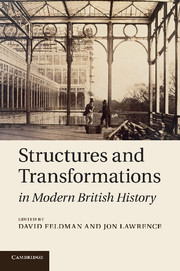Book contents
- Frontmatter
- Contents
- List of figures
- Notes on contributors
- Introduction: structures and transformations in British historiography
- 1 Coping with rapid population growth: how England fared in the century preceding the Great Exhibition of 1851
- 2 The ‘urban renaissance’ and the mob: rethinking civic improvement over the long eighteenth century
- 3 Forms of ‘government growth’, 1780–1830
- 4 Family formations: Anglo India and the familial proto-state
- 5 The commons, enclosure and radical histories
- 6 Engels and the city: the philosophy and practice of urban hypocrisy
- 7 The decline of institutional reform in nineteenth-century Britain
- 8 British women and cultures of internationalism, c.1815–1914
- 9 Psychoanalysis, history and national culture
- 10 Labour and the politics of class, 1900–1940
- 11 The dialectics of liberation: the old left, the new left and the counter-culture
- 12 Why the English like turbans: multicultural politics in British history
- Index
7 - The decline of institutional reform in nineteenth-century Britain
Published online by Cambridge University Press: 04 February 2011
- Frontmatter
- Contents
- List of figures
- Notes on contributors
- Introduction: structures and transformations in British historiography
- 1 Coping with rapid population growth: how England fared in the century preceding the Great Exhibition of 1851
- 2 The ‘urban renaissance’ and the mob: rethinking civic improvement over the long eighteenth century
- 3 Forms of ‘government growth’, 1780–1830
- 4 Family formations: Anglo India and the familial proto-state
- 5 The commons, enclosure and radical histories
- 6 Engels and the city: the philosophy and practice of urban hypocrisy
- 7 The decline of institutional reform in nineteenth-century Britain
- 8 British women and cultures of internationalism, c.1815–1914
- 9 Psychoanalysis, history and national culture
- 10 Labour and the politics of class, 1900–1940
- 11 The dialectics of liberation: the old left, the new left and the counter-culture
- 12 Why the English like turbans: multicultural politics in British history
- Index
Summary
If Richard Cobden, John Stuart Mill or any other rationally inclined mid-Victorian liberal writer were to inspect the state of England 150 years after their heyday, they would surely be surprised to find the country still in possession of a hereditary monarchy, an Established Church, and a socially well-entrenched army and diplomatic service. Surprised rather than astonished, since Cobden and Mill both lamented the continuation of ancien régime elements of English political practice into their own day, so could appreciate their tenacity. Nonetheless, Victorian radicals attached so much importance to the reform of the institutions of state, and could look back on a recent period of such significant activity in all these fields, that the rapid waning of emphasis on institutional reform would probably strike them as a major discontinuity.
The purpose of this chapter is to explain that declining emphasis, in the light of radicals' earlier focus on the subject. Quarrels about the power, accountability and cost of the Crown – that is, the monarch, the monarch's ministers, and the officers appointed by government, at home and in the diplomatic service – have long been recognised to be central to politics in the ‘long eighteenth century’, to 1832, and have been well covered by historians. But their aftermath has been studied much less. Moreover, though there are useful treatments of particular episodes in the reform of the Crown, and the associated institutions of the army and the Church, during the post-1832 period, important connections between the several reform processes have not been made.
Keywords
Information
- Type
- Chapter
- Information
- Structures and Transformations in Modern British History , pp. 164 - 186Publisher: Cambridge University PressPrint publication year: 2011
Accessibility standard: Unknown
Why this information is here
This section outlines the accessibility features of this content - including support for screen readers, full keyboard navigation and high-contrast display options. This may not be relevant for you.Accessibility Information
- 1
- Cited by
